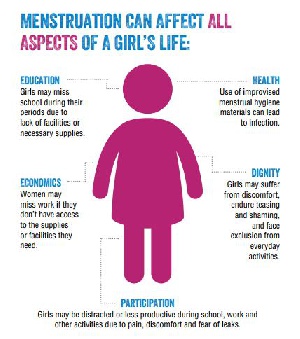Growing up in the village with my mum, I realized that there were certain times in the month that my mum will just stay in the room throughout, sometimes for up to a week. All she did was to eat, take her bathe, then sleep. I never understood why until I got a bit older.
It was all because she was “menstruating”. She was considered unclean and so she was not allowed anywhere near my father until her period was over. She couldn’t cook, wash or even touch anything that will be used by my father or any male in the house (that was 12 years ago).
A lot of things have changed since then but this problem still exists in some villages in the Northern Region of Ghana.
Menstruation is a normal monthly flow of blood and any adolescent girl could experience this. Culturally and religiously, the people of the Northern region believe that a menstruating woman is impure and therefore cannot mix with other people, especially males. Thanks to education, many people are now enlightened about this condition but there are people who still hold this notion, particularly Islamic and Traditional Communities.
Girls of school going age are the most affected by this mentality. They have to stay out of school throughout their period because they are stigmatized by boys. The case is even worse for girls who live in poor and deprived communities. They do not have any knowledge about menstrual hygiene and do not know how to manage themselves during their period so that the boys do not find out. Some do not have access to hygiene products and in cases where they do, they cannot afford them.
Some of these girls use rags made from old clothes to catch the flow of blood during their period. They wash these rags (sometimes without soap) and hang them in the room because they are too shy to dry them in the sun. For girls whose parents are able to buy them sanitary towels, they use just one for a full day because they have to manage it to last the whole period. These practices pose serious health problems to the girls.
Besides, some schools do not have facilities that will aid them to manage this condition properly while they are in school. In the case where they stain their clothes with the blood (which happens often), they have to go back home to change and some do not come back to school.
According to a report launched by Catholic Relief Services (CRS –a Christian NGO) in 2016, 95% of girls stay out of school during their period because they are shy, and 20% stay out because their schools do not have facilities to help them manage the condition.
With the help of Non-Governmental and Civil Society Organizations like UNICEF, CRS, NOORSAC and Girls’ World, menstrual hygiene is improving in the Northern region but more education and facilities are needed to get everyone covered.
Opinions of Friday, 22 March 2019
Columnist: Georgina Wunkumi Mabe



















